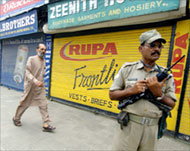Indian PM meets Kashmiri separatists
India’s prime minister, who has held a landmark meeting with Kashmiri separatists, says he will cut troops in the disputed territory if violence and infiltration by separatists from Pakistan stops.

He also pledged respect for human rights in the Himalayan region where tens of thousands have died.
The three-hour meeting, which included formal talks and dinner, came after Prime Minister Manmohan Singh agreed to the first-ever official talks between an Indian leader and moderate Kashmiri separatists since an anti-Indian uprising erupted in 1989.
Kashmir is held in part but claimed in full by both India and Pakistan.
Singh pledge
“The prime minister said that if there is a cessation of violence and end to infiltration, conditions will be created for the reduction of armed forces [in Kashmir]”, a statement from the prime minister’s office said.
 |
|
Singh said he would cut troops |
He also pledged to meet the separatists again to discuss steps to reduce violence in the state, including rights abuses by Indian troops.
The troops are the target of wide resentment among many Kashmiris.
“He agreed to review all cases of those held in detention and ensure that violation of human dignity would not be tolerated and the government would take all necessary measures to safeguard against human rights violations,” the statement said.
Rights abuses
Analysts estimate about 400,000 Indian soldiers are posted in Kashmir and said the pledge to halt rights abuses was significant.
 |
|
The presence of Indian troops are |
“The promise of stemming human rights abuses is the most welcome gesture,” said political scientist Rajendra Dayal, of the Delhi University.
“But what makes it very important is that this is the first direct contact between an Indian head of government and moderate separatists.”
The discussions are part of a wider peace process between India and Pakistan to settle a long-festering dispute over the scenic Himalayan territory that has triggered two of their three wars.
Peace process
The nuclear-armed neighbours have been engaged in a formal peace process since early 2004. Singh is scheduled to meet Pakistani President Pervez Musharraf in mid-September in New York, where Kashmir will be a key topic.
|
“But what makes it very important is that this is the first direct contact between an Indian head of government and moderate separatists” Rajendra Dayal, |
Muslim cleric Mirwaiz Umar Farooq, who leads the moderate faction of Kashmir’s main separatist alliance, the All Parties Hurriyat Conference, was accompanied to the meeting by fellow separatist leaders Abdul Gani Bhat, Maulana Abbas Ansari, Fazal Haque Qureshi and Bilal Lone.
The delegation was also part of a Hurriyat team which visited Islamabad in June for talks with Pakistani leaders.
Farooq, 32, said the talks were fruitful.
“We had a very detailed discussion, a very heart-to-heart discussion,” Farooq said.
Separatists
The government statement said the Hurriyat told Singh it was committed to talks and an end to violence.
“The All Parties Hurriyat Conference delegation stressed that an honourable and durable solution should be found through dialogue.
“It was agreed that the only way forward is to ensure that all forms of violence at all levels should come to an end,” it said.
Talks with India were “part of a triangular process”, Farooq said in a weekend interview, referring to India’s holding talks with Pakistan while the separatists hold dialogue with both India and Pakistan.
India says, however, that any final solution can only be reached bilaterally with Pakistan and has said there could be no redrawing of boundaries.
Most of the moderates say they want an independent Kashmir but talk increasingly of borders “becoming blurred”.
But hardline Hurriyat members who oppose the talks want Kashmir to be folded into Pakistan.
The head of the hardline separatists, Syed Ali Geelani, said the talks “would go nowhere” and “dishonour the thousands of martyrs who have died for the cause”.
The separatist war has claimed at least 44,000 lives by official count. Separatists say the toll is at least double.
“Those entering into talks with New Delhi have no representative character,” Geelani, 72, said in Srinagar on Monday.